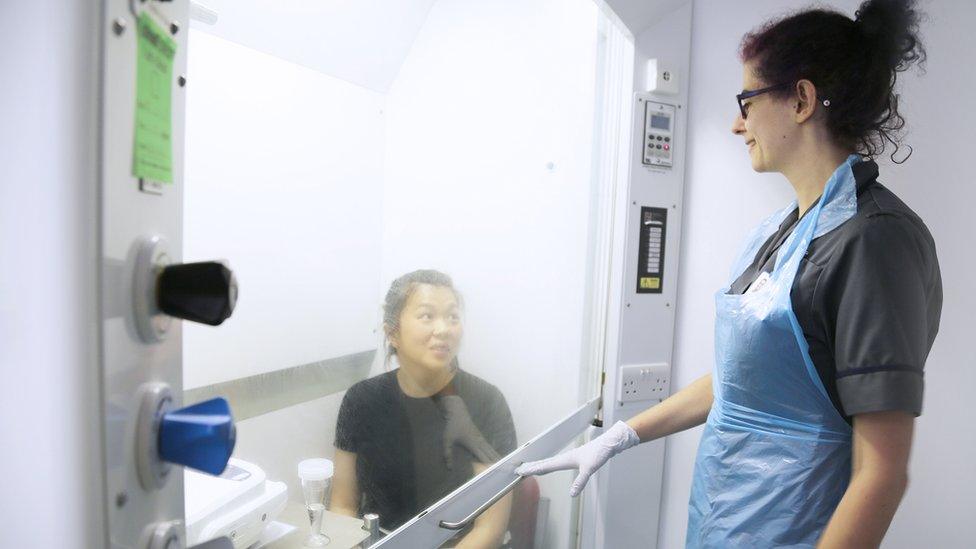Catch whooping cough and get £3,500
- Published

How much money would it take to persuade you to be deliberately infected with whooping cough for the sake of medical science?
Researchers at Southampton University are offering people up to £3,526 to take up the challenge.
They want to make a better vaccine to protect babies, toddlers and vulnerable adults against the disease.
To help, you must be aged 18-45, in good health, willing to live in an isolation unit for 17 days - and sing.
Cough droplets
Whooping cough, or pertussis, is a highly infectious bacterial disease that is spread by airborne spit or cough droplets from infected people that others inhale.
The Southampton team want to infect healthy people (by sticking pertussis bacteria up their nose) and see how well they fare.
Some of the volunteers will get sick, but the scientists are most interested in those who do not develop any symptoms even though they have been exposed to the bug in the nasal drops.
What they are hunting for is silent carriers, and people who are naturally immune to the infection.
Silent carriers still spread the infection to other people, but do not get sick themselves.
They appear to have enough immunity to fight the disease, even though they have not been vaccinated.

A few people, however, are completely impervious to the infection. Understanding why this is could help with designing an improved vaccine.
Lead researcher Prof Robert Read, director of the NIHR Southampton Biomedical Research Centre, said: "We want to know what's so special about these people and why we can't make them into silent carriers."
Deliberate infection
Prof Read's human experiment is part of a £24m research collaboration, external backed by the Bill and Melinda Gates Foundation, as well as the pharmaceutical industry, to develop an improved vaccine.
He wants 35 people to help him and his team with the initial stage of their research.

Prof Read says volunteers deserve adequate financial compensation for their time
Once they have been deliberately infected with the pertussis bug, these financially compensated volunteers will live in isolation at the research institute for 17 days.
They will get a private room, with access to toilets, showers and a recreational area.
Meals, drinks, snacks and entertainment will also be provided, but they will have to wear a mask when they have any visitors or contact with staff to ensure they do not infect others.
Volunteers will have nasal and throat swabs taken throughout the study and will be asked to supply nasal fluid samples by washing out their nostrils and leaving bits of filter paper up their nose for five minutes at a time.
These procedures can be "a little uncomfortable or cause gagging, but this will resolve quickly and should not be painful or pose any risk to you", the information sheet for volunteers advises.
Volunteers will also be required to sit in a glass cupboard - the "cough box" - and talk, cough and sing to make spit droplets in the air for the researchers to sample.

The cough box that will be used in the experiment
They will undergo psychological tests throughout their stay, to check their mental wellbeing.
Before they are released back into the community, they will be given antibiotics to clear up any pertussis infection.
Prof Read says the experiment is "safe and ethical" - they will use as low a dose of pertussis as possible. Volunteers can also quit the experiment at any time.
"It may sound a bit Big Brother-ish, but they are free to leave. We will make sure the volunteers fully understand what is involved so they can truly consent."
Whooping cough
In adults, pertussis causes cold-like symptoms and a stubborn cough that can last for months. It can be serious and need antibiotics. Adults can pass the bug on to babies and infants. For the, the infection can be extremely dangerous and deadly.
Pertussis is a notifiable disease, external in England and Wales. Immunisation is the most effective way to protect against it.

Young children who get the infection may have fits of coughing that end in loud gasping "whoops"
The UK has seen a marked increase in cases of pertussis in recent years. Since 2012, 18 babies have died from the disease.
Globally, pertussis kills hundreds of thousands of children, which explains why there is a big international push to make a new vaccine.
There is an existing one that can prevent the infection, but it is not as effective as doctors would like it to be and its protection wanes in individuals over years.
Antibiotics can stop people spreading pertussis, but silent carriers are not aware that they are infected.
Anyone interested in taking part can email UHS.recruitmentCRF@nhs.net
Follow Michelle on Twitter, external
- Published6 April 2016
